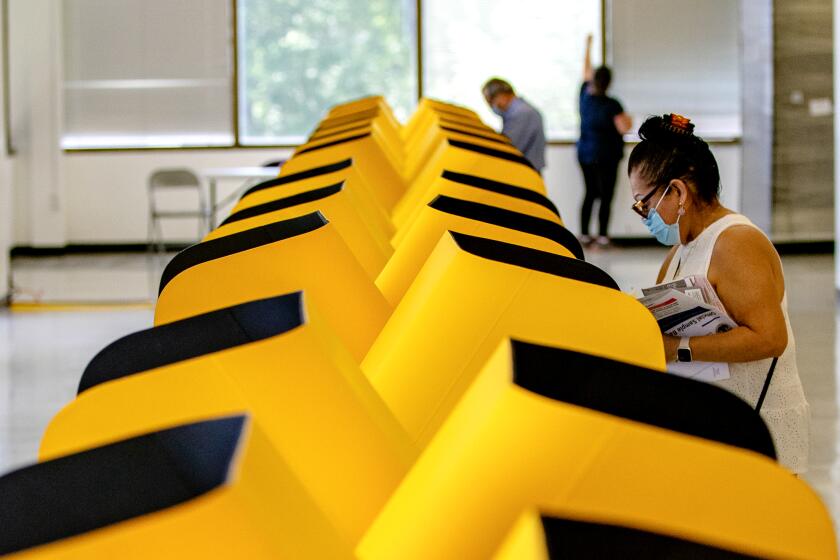What’s on the 2024 California primary election ballot?

- Share via
California’s primary election is March 5, or Super Tuesday, when voters in more than a dozen states will weigh in on whom their party should nominate for president.
Beyond the presidential race, Californians will make many other consequential decisions in this election. Following the death of Sen. Dianne Feinstein, the state’s U.S. Senate contest is among the most competitive and expensive in the nation. Retirements by several Congress members leave voters to choose new representatives in parts of California. Voters will also weigh in on legislative and local contests and a multibillion-dollar ballot measure.
Here’s what you need to know:
When is the election?
Election day is March 5. But in California, it’s really an election month, with ballots sent to the state’s 22 million registered voters on Feb. 5. Voters can return their ballots by mail or in person through election day.
What to know about the presidential race
The GOP presidential battle between former President Trump and former U.N. Ambassador Nikki Haley is receiving the most attention.
California has the most delegates of any state in the nation — roughly 14% of the number required for a Republican presidential candidate to secure the party’s nomination.
California’s primary election takes place on March 5. Read up on the races in L.A. city, L.A. County and other areas.
Trump bested Haley in Iowa and New Hampshire — the first two GOP nominating contests in the nation. But if she remains in the race through Super Tuesday, California will be a focus of both campaigns.
Democrats will also pick their nominee. President Biden will easily win the state, but other candidates including former Los Angeles spiritual leader Marianne Williamson and Rep. Dean Phillips of Minnesota will appear on the ballot.
Several third-party candidates will also appear on the ballot, including author and academic Cornel West, who is on the Peace and Freedom Party ballot, and perennial candidate Jill Stein, who is running to be the Green Party nominee.
Notably, Robert F. Kennedy Jr., who lives in Los Angeles part of the year with actress wife Cheryl Hines, will not appear on the ballot. The son of the former senator who was assassinated in 1968, Kennedy Jr. initially planned to run as a Democrat but then announced he would run as an independent. Candidates not affiliated with a political party do not appear on the primary ballot but can appear on the general election ballot if they submit more than 219,000 signatures (1% of the number of registered voters in the state).
Why the U.S. Senate contest is on the ballot twice:
One question asks voters to fill the remainder of the late Sen. Dianne Feinstein’s term, which ends in January and is currently occupied by gubernatorial appointee Laphonza Butler, who is not running to fill the rest of Feinstein’s term or for the full term.
In the 2024 election, Californians will be asked to vote for a new U.S. Senator for separate times. It could introduce a note of chaos into the competitive Senate primary, which already has a crowded field of candidates.
The other question asks Californians to pick their choice for a full six-year term, the subject of a heated battle among Democratic Reps. Adam B. Schiff of Burbank, Katie Porter of Irvine and Barbara Lee of Oakland, Republican and former Dodger star Steve Garvey and several other candidates.
Under California’s open primary system, the two candidates who receive the most votes in the primary advance to the general election regardless of party or whether either wins a majority. Political observers across the nation are watching this race to see if two Democrats will vie for the Senate seat in November, or if Garvey consolidates GOP support and snags one of the top two spots, which would dramatically alter the contest’s trajectory.
What to know about House races:
Voters elect members of Congress every two years. House races in some parts of California are seeing heated competition and could be key to determining whether Republicans hold on to their control of Congress or Democrats win back the body.
Ten of the state’s 52 congressional races are rated as competitive by the nonpartisan Cook Political Report, including the seats held by Reps. Mike Garcia of Santa Clarita, Michelle Steel of Seal Beach and Ken Calvert of Corona — all Republicans — as well as the Orange County seat being vacated by Democrat Porter as she runs for Senate.
Seven members of the California delegation announced that they would not run for another term in 2024, including the three top Democrats who are running for Feinstein’s Senate seat.
Also on the ballot:
Voters will also cast ballots on Proposition 1, a $6.4-billion bond to build treatment facilities for people with mental health and substance abuse issues as well as housing for the homeless. The measure is sponsored by Gov. Gavin Newsom and has garnered unusual bipartisan support in the Legislature.
Also on the California ballot: 80 state Assembly seats, 20 state Senate seats and many local offices.
More to Read
Sign up for Essential California
The most important California stories and recommendations in your inbox every morning.
You may occasionally receive promotional content from the Los Angeles Times.













